Choosing a quality VPN that will fulfill your needs is harder than you think. Oftentimes, you have to deal with various compromises and in many cases, you’re looking at a price way out of your budget. This especially rings true when talking about two VPNs in different price spectrums.
You see, ExpressVPN is known as a slightly more expensive choice compared to its competitors. However, it’s also known to be the best among them, providing blazing-fast speeds, stable performance, above-average streaming capabilities, and a no-logging policy.
Then, we have CyberGhost, a sister company of ExpressVPN. It’s known for very affordable prices, thousands of servers, solid performance, and lots of security features. It’s surprisingly good for the price and serves thousands of users daily, making it a very prominent choice on the market.
Despite their price differences, ExpressVPN and CyberGhost are actually similar in many ways as much as they’re different in certain aspects. If you’re looking for a comprehensive CyberGhost vs ExpressVPN comparison in 2025, this is the one to read.
Today, I’ll try to rid you of any dilemmas in regard to which VPN of these two to buy. My CyberGhost vs ExpressVPN duel will compare the two providers side by side across several tests to see which one is a better choice, both in overall performance and price.
3000 servers
105 covered countries
30 days money-back guarantee
8 simultaneous connections
9.4 /10
12000 servers
100 covered countries
45 days money-back guarantee
7 simultaneous connections
9.2 /10
CyberGhost vs ExpressVPN: Apps & Ease of Use
Your first contact with a VPN provider starts off with its applications. Thankfully, both CyberGhost and ExpressVPN have a LOT to offer in this regard. Both providers offer native applications for all major and less popular platforms, which we value extremely.
You can install them on Windows, iOS, Android, macOS, Linux, and even platforms like Android TV, Fire TV Stick, and Samsung Smart TV. In addition, both providers support routers, albeit, I found ExpressVPN’s support for routers to be a tad better.
It not only supports more router models but its setup tutorials are overly good and you’ll have a bit easier time setting up this VPN on a router than CyberGhost. The cheaper provider had one advantage up until recently but ExpressVPN made sure to eliminate it.
That is the number of simultaneous connections. I always criticized ExpressVPN for sticking to 5 connections but now, in 2025, that number increased to 8, so my complaints were not in vain. CyberGhost, on the other hand, has 7 connections, which is one less than ExpressVPN and one more than NordVPN.
CyberGhost
Once you subscribe to CyberGhost, you’ll be able to install its applications. This time, I’ll analyze its Windows app since it resembles the app on macOS, and these two apps are used the most. As you can see below, the provider isn’t exactly minimalistic, although the app looks fairly decent.
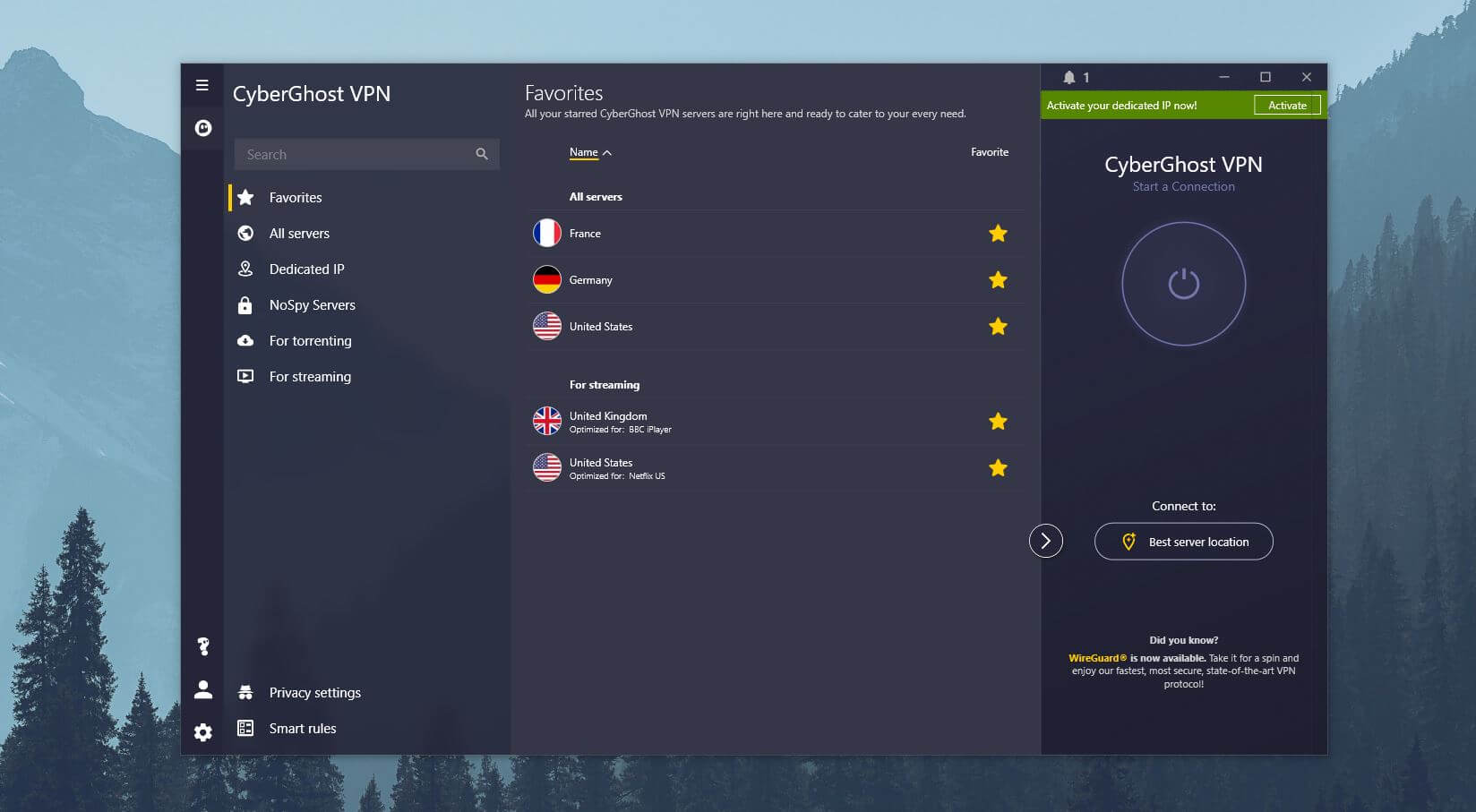
You get a big connection button on the right with all the other settings and servers on the left. Connecting to a server can be done via the connection button but I recommend double-clicking on the server location instead, which will give you the same effect.
Moving on, the provider has specialty servers that you can access with a single click of a mouse. Then, there are numerous Settings menus which is what I always found confusing. Even on this day, in 2025, after using this provider for a decade, I can’t remember which setting is where.
By clicking on the Gear icon, you can change your VPN protocol, enable TCP, and disable IPv6 connections when connected to a VPN. Clicking on Smart Rules lets you set the behavior of the app as well as enable Exceptions, which is a fancy name for split tunneling.
If you click on Privacy Settings, you can find three great features. There’s an ad blocker for blocking ads and trackers, DNS leak prevention, and an automatic kill switch. Needless to say, all three of them are enabled by default and I don’t recommend turning them off.
Overall, CyberGhost looks decent and it’s fairly easy to use but only after you get used to it, which takes a bit of time. Its Settings menus are all over the place and the app is a bit clunky on Windows. iOS and Android VPN apps are much better, to be honest, where CyberGhost is also much easier to use.
ExpressVPN
On the other hand, we have ExpressVPN, which follows a completely different philosophy compared to CyberGhost. It’s extremely easy to use, it’s intuitive, and it takes very little to get used to its interface which looks identical on ALL supported platforms!
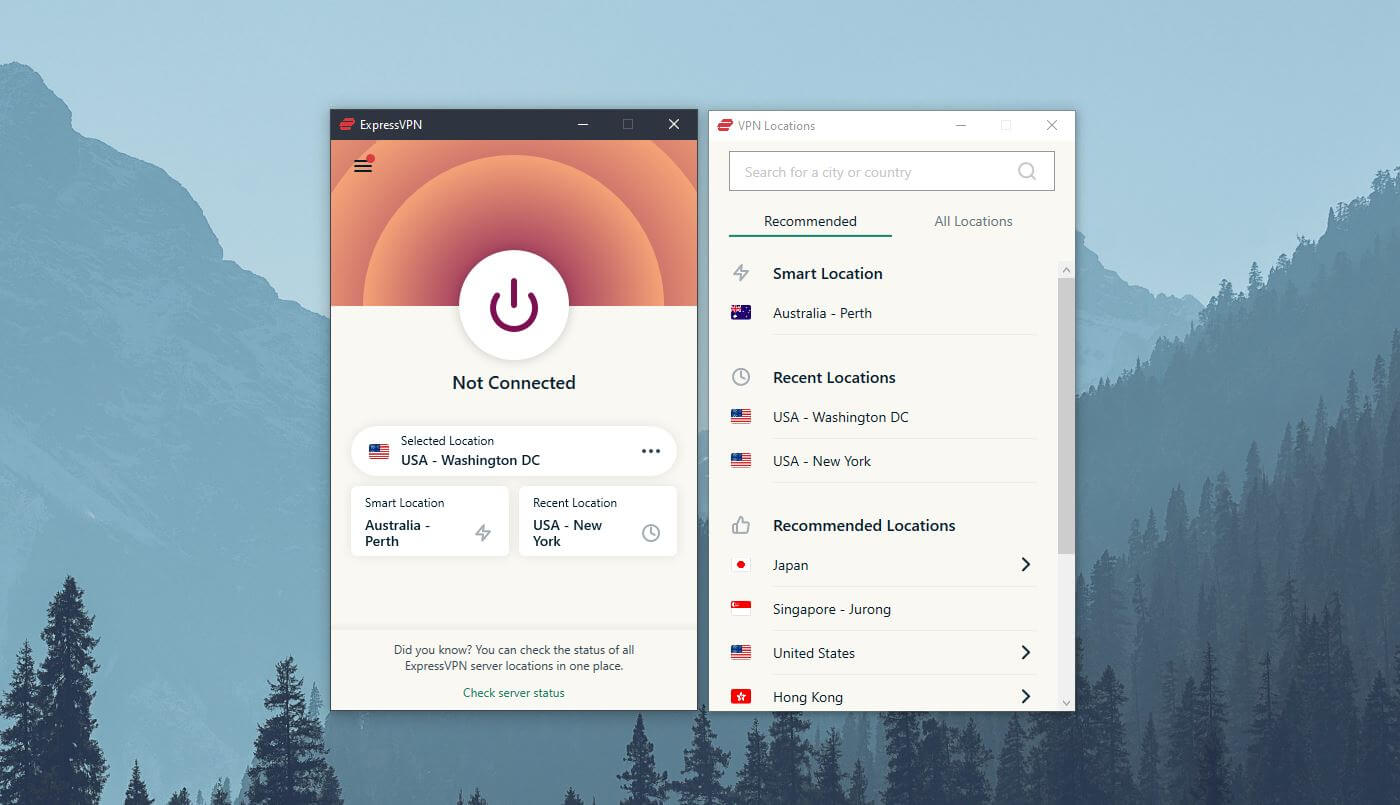
The app on Windows is basically the window on the left (look at the image above) and the right window is the server list. That’s all. If you want to connect to a server, just double-click on the country of your choice and ExpressVPN will connect in a blink of an eye.
Seriously, this app is so fast and smooth that it kinda makes CyberGhost a bit obsolete. There’s the ability to connect to a Smart Location for the best speeds and you can choose server locations based on their continents by clicking on “All Locations.”
To open the Settings menu, simply click on three horizontal dots in the upper-left part of the window and select Options. Here, a new window with settings will open but all of the VPN-related settings are located in just TWO sub-menus.
In General, you can enable Network Lock (kill switch), use split tunneling, and change the behavior of the app. Then, if you click on the Protocol menu, you can change the protocol to the one you want, and that’s pretty much it.
You have a Shortcuts menu as well, which lets you quickly access your favorite apps and websites while connected to a VPN, and the Advanced menu lets you share crash reports and usability diagnostics with ExpressVPN’s team for improvement. That can be disabled, of course.
Who Wins?
In this part of the CyberGhost vs ExpressVPN duel, ExpressVPN WINS. It offers slightly better router support and has 8 simultaneous connections instead of the 7 in its rival. Not to mention that its applications are way easier to use on all platforms, which is another noticeable difference.
Security & Privacy: Which One Is Safer to Use?
A mandatory part of our CyberGhost vs ExpressVPN comparison for 2025 is talking about security and privacy. Since we’re talking about some of the best VPNs your money can buy, you most likely expect them to be as secure as possible. And, might I add, you’re right about that!
Security Features
Keep in mind that these providers share the same father company, Kape Technologies, which I highlighted in my review of ExpressVPN. This means they also share some of the features that I’m going to talk about in this part of the comparison.
Starting off with encryption, both of them use 256-bit AES encryption backed up by an automatic kill switch and IP/DNSv6 leak protection. In addition, both providers support OpenVPN, which is great if you prefer using it as a tried-and-tested solution for security and privacy.
Another thing worth pointing out is that both providers offer split tunneling if you’re into that, and both of them use RAM-based servers. This is crucial for ensuring that no data is being stored on servers, which, once again, makes everything more private and anonymous.
CyberGhost and ExpressVPN also have proprietary DNS servers. This feature is called PrivateDNS and you can find it in both services. They use their DNS servers to handle your DNS requests instead of relying on free DNS services that usually keep logs of your online whereabouts.
Moving on, the VPNs are similar when talking about bonus features. Namely, both have an ad blocker that can block trackers and malicious sites. ExpressVPN calls this feature Advanced Protection on PC platforms and Threat Manager on mobile devices.
What Are the Differences?
As you can see in this ExpressVPN vs CyberGhost VPN comparison, the providers share some basic features. However, if we talk about advanced functionalities, there’s much more to be said. Let’s start with CyberGhost.
This provider offers additional protocols in the form of IKEv2 and WireGuard. WireGuard is currently among the fastest protocols, allowing CyberGhost to maintain excellent performance with stellar network stability.
Moreover, we already mentioned its ad blocker which I found very useful for getting rid of stubborn ads and pop-ups that plague nearly every popular site. I criticized ExpressVPN for not having this feature, and in 2025, it was hard to do it because the provider finally improved.
Now, it’s even better than CyberGhost because of Parental Control. This feature lets you block porn sites and adultery, in general, protecting your children from this nasty content. CyberGhost doesn’t have this feature, instead, it relies on an ad blocker only.
This provider also offers the so-called NoSpy servers. These servers are based in Romania and are directly operated by CyberGhost, making sure you get the highest level of privacy. This is yet another security measure that I use a lot and never had issues with it.
ExpressVPN has seemingly no advanced features in its application aside from the ones we mentioned. However, I call those “passive” security features and one of them is ExpressVPN’s Private DNS. This provider uses its own DNS service to route your traffic and secure your connection, as said.
Instead of using a third-party DNS like Cloudflare or God forbid Google, it has an in-house solution. This is so much better in terms of privacy, as every bit of traffic goes through ExpressVPN’s no-log DNS, ensuring no one can track your online activities.
Every subscription you get allows you to use something called ExpressVPN Keys. It’s a password manager that you get for free. While not the best in the world, it’s driven by the provider’s excellent security to keep your passwords safe and sound. Very handy, indeed.
This provider also has a proprietary protocol called Lightway. We don’t know yet the recipe for this protocol but we do know it’s the best in the business. Lightway is extremely fast and it makes connections pretty much instant, which I haven’t seen with any other provider.
That’s why it’s one of the fastest VPN services for browsing, streaming, and torrenting.
Is There a No-Logs Policy?
With so many security features, our CyberGhost vs ExpressVPN comparison should be interesting when talking about logging practices. Well, I think it isn’t very interesting, as both providers are known for their stringent no-logging business models.
Still, there are a few differences even in this case.
Let’s start with CyberGhost. The provider is based in Romania, a country out of the 5 Eyes alliance, and one of the best privacy-friendly jurisdictions. With no data-retention laws, the provider is clear to maintain a no-logging policy and store absolutely no compromising logs of its users.
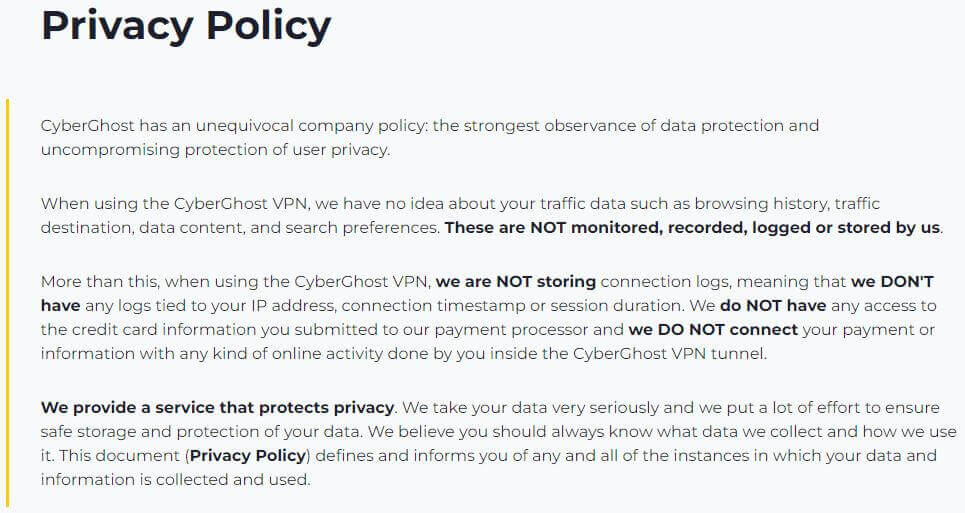
It stores no data regarding your IP addresses, DNS requests, browsing history, traffic metadata, geolocation, etc, etc. It does store information related to your email and payment method for activating your subscription, plus a few other unimportant tidbits for troubleshooting and maintenance.
Interestingly, it also has an audit from Deloitte, which puts it at a slight advantage because it has another solution in addition – transparency reports! These are published every 3 months e.g. 4 times a year and you get all the information regarding its DMCA requests and other information here.
This adds to the overall trustworthiness, as well as the fact that CyberGhost never leaked any data to the authorities. The same can be said about ExpressVPN – almost. You see, this provider is based in the British Virgin Islands, an off-shore, privacy-friendly location perfect for a VPN service.
ExpressVPN, therefore, nourishes its no-logs policy which received special audits from PricewaterhouseCoopers, KPMG, and Cure53, indicating that its claims are indeed true. Much like CyberGhost, ExpressVPN stores zero sensitive logs, ensuring you browse the web anonymously.
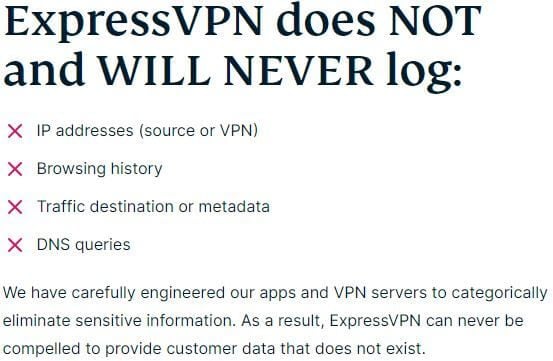
The information it stores is in an anonymized form and includes your app version, total amount of used bandwidth, and dates of connection to a VPN service. It stores no info on your browsing history, however, and it has no way of finding out how you used the Virtual Private Network.
This is, unfortunately, proven in the investigation of the brutal murder of Andrei Karlov in Turkey. When the Turkish authorities seized ExpressVPN’s server that was reportedly used to delete information about the assassin, they found no additional data on the server.
Who Wins?
In this part of my comparison, the result is a DRAW. Both providers offer a myriad of security features, they both store no logs, and they have no issues with leaking user-related data to the authorities, which was the case with many other VPNs.
CyberGhost vs ExpressVPN Streaming Test
If you need a VPN for streaming purposes, you’re looking at some of the best providers in the business. This CyberGhost VPN vs ExpressVPN comparison will tell you everything you need to know about this aspect, so let’s see which provider is better in the streaming comparison.
Netflix Test
As always, I’ll start off with Netflix since I think it’s the most prevalent streaming service. Many providers struggle to unblock Netflix libraries and I understand them because of Netflix’s strong anti-VPN measures that still reign supreme.
However, if you’re looking to expand your horizons and unblock more than a few libraries, should you even consider these providers? My answer is YES, but I think ExpressVPN is a bit better since it can unblock a wider selection of libraries in general.
CyberGhost has these dedicated streaming servers optimized for a few catalogs but I’ll be honest – they aren’t always working perfectly, especially when talking about more “exotic” libraries like Netflix Japan. Either way, let’s take a look at the results and you be the judge.
CyberGhost
Netflix US (Grey’s Anatomy): NOT WORKING
Netflix Canada (Midnight in the Switchgrass): WORKING
Netflix Japan (Naruto Shippuden): NOT WORKING
ExpressVPN
Netflix US: WORKING
Netflix Canada: WORKING
Netflix Japan: WORKING
As you can see, ExpressVPN worked with all 3 tested platforms. However, it can unblock Netflix Australia, France, Hungary, and many other catalogs – around 15 of them in total. CyberGhost doesn’t work with Netflix US and Japan, unfortunately, and the number of libraries it can unblock is way smaller.
Other Streaming Platforms
If you’re interested in streaming content on other platforms, both providers will be a solid choice in terms of unblocking capabilities and performance. It’s important to note that you’ll need to use CyberGhost’s streaming servers often when streaming.
For example, its “normal” servers sometimes won’t unblock particular platforms, which is rectified by using the streaming server in the same country. This happened to me when I tried to watch NBC using a “normal” server. It didn’t work until I switched to a streaming server for NBC.
ExpressVPN, on the other hand, has no dedicated servers, meaning that all servers are capable of streaming. I find this to be an advantage in terms of ease of use, but either way, when testing Hotstar and BBC iPlayer, both providers showed great results.
Who Wins?
In this part of my CyberGhost vs ExpressVPN duel for 2025, ExpressVPN WINS. It can unblock way more Netflix catalogs and all of its servers are streaming-friendly, which isn’t the case with CyberGhost which sometimes “forces” you to use streaming-optimized servers to unblock the platform you want.
CyberGhost vs ExpressVPN Speed Comparison: Which One Is Faster?
As said in this ExpressVPN vs CyberGhost comparison, both providers are known for more than great performance for all purposes, be it streaming, torrenting, or simply browsing the web. However, there are some differences in performance that I must mention.
Before I do that, I’ll need to clarify how I tested these providers. For the start, I set the protocol selection to Automatic, making sure that each provider decides on the best protocol for my needs. This will make the result authentic and show how good each VPN is in terms of optimizing performance.
Once I did that, I tested each provider for 3 days in a row, 3 times a day, usually in the morning, in the evening, and at midnight when the servers were usually very busy. I also used 4 server locations – the UK, the US, Australia, and Japan. Note that I’m located in Europe.
My native internet speeds look like this:
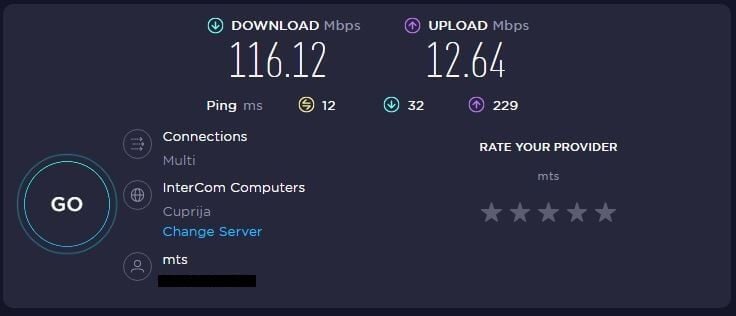
I don’t have the fastest internet but that doesn’t matter in this case. We’re looking only at percentages that will also apply to your internet speed, be it slower or faster. With these parameters in place, I compiled the best results, so let’s see how well these providers performed.
CyberGhost
UK:
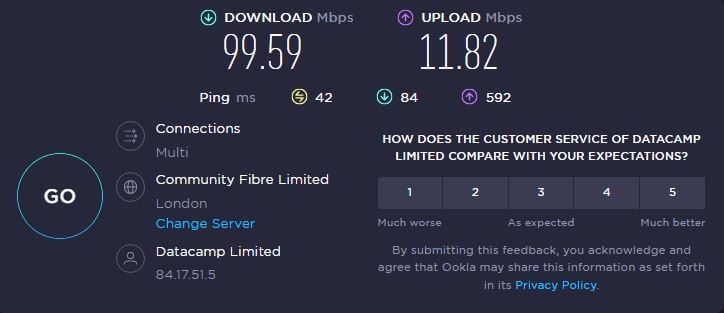
US:
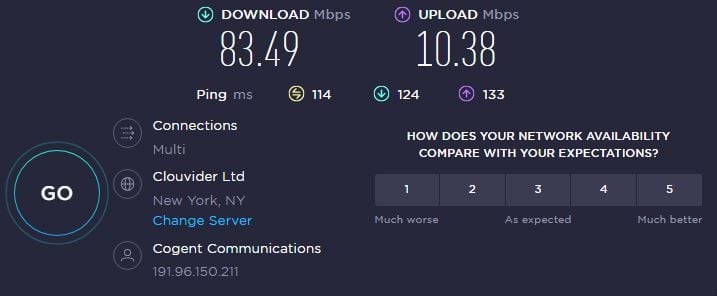
Australia:
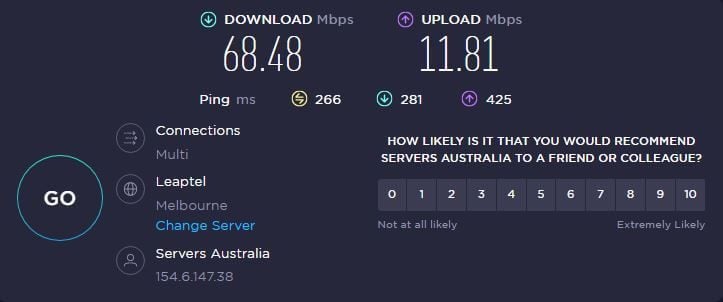
Japan:
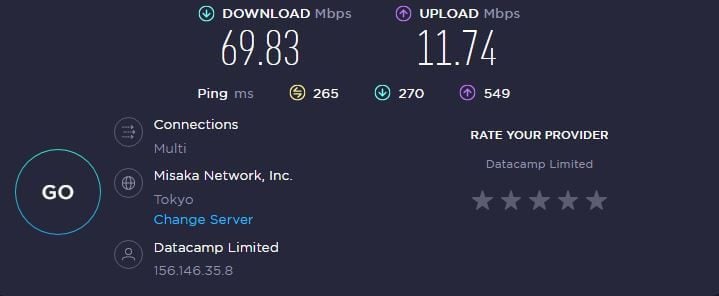
ExpressVPN
UK:
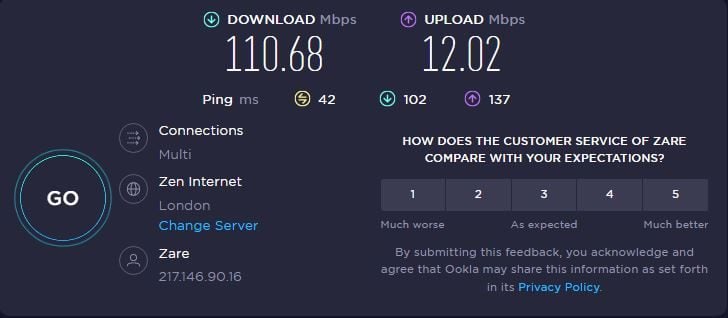
US:
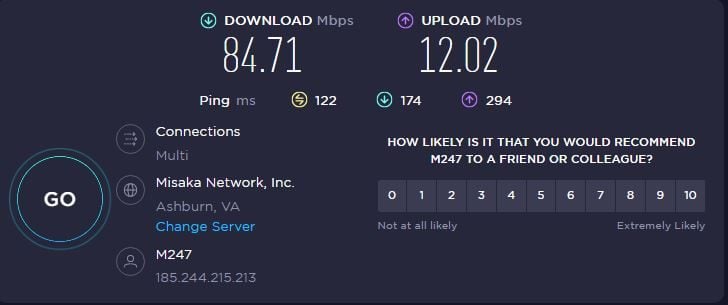
Australia:
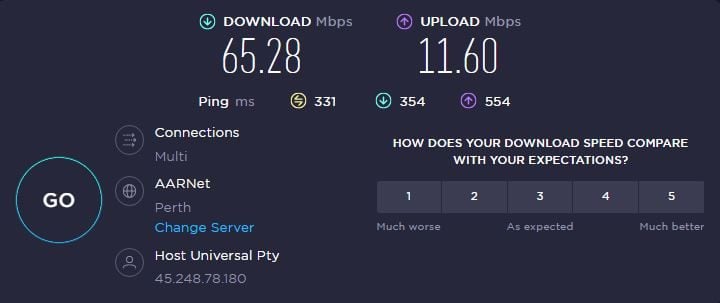
Japan:
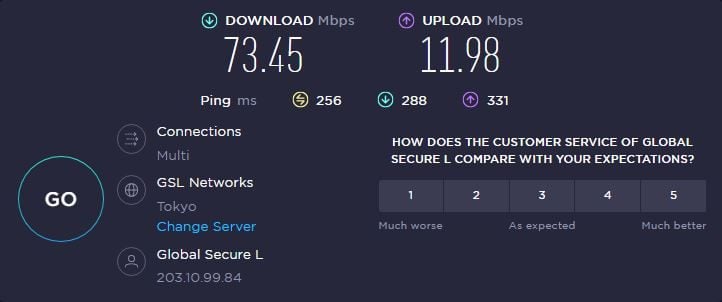
Who Wins?
In this part of the comparison, ExpressVPN WINS because it’s faster on 3 out of 4 tested locations. It only showed slightly slower speeds in Australia, while in the UK, the US, and Japan, ExpressVPN performed a bit better than CyberGhost.
Torrenting: Are CyberGhost and ExpressVPN P2P-Friendly?
If you’re looking for a VPN that you can use with BitTorrent or any other torrent client, will these two satisfy your needs? Absolutely. As some of the best providers around, ExpressVPN and CyberGhost had P2P activities on their minds as well when designing their services.
ExpressVPN and its focus on privacy and security surely give you a lot to look forward to when talking about anonymous torrenting. Coupled with exceptional performance and speeds, you’re looking at perhaps the best torrenting experience out of all VPNs.
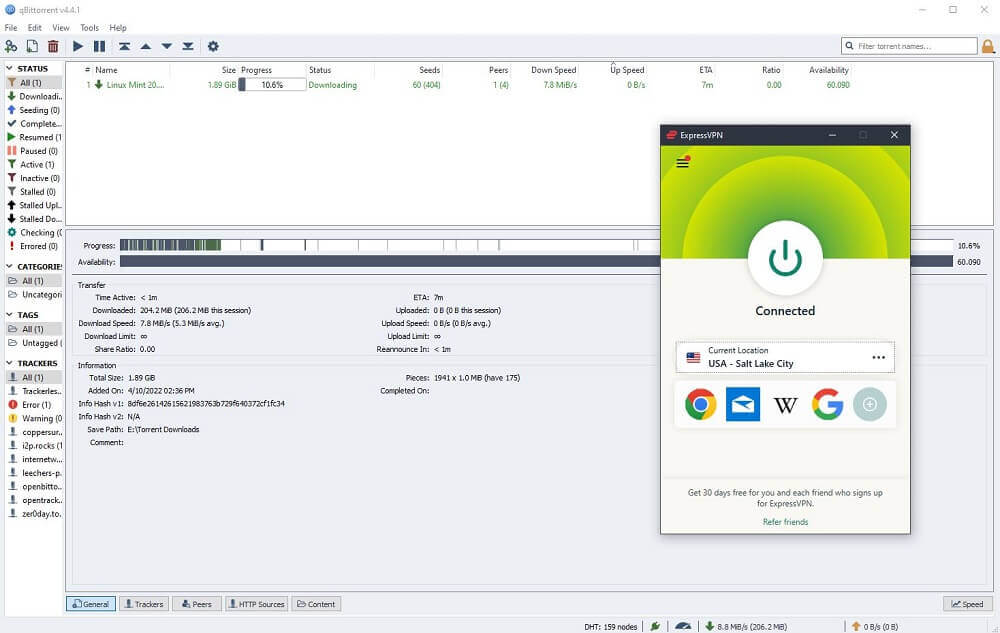
Even when using a few distant servers, you can expect awesome performance and speeds, which is what makes this provider so special. Not to mention that EVERY server is compatible with torrenting, so you don’t need to adjust by selecting P2P servers or enabling special protocols.
Simply use its Smart Location feature to get the server with the best performance, turn on your torrent client, and start downloading. CyberGhost does offer P2P servers in conjunction with the streaming servers I talked about earlier in this comparison.
However, it doesn’t force you to pick a P2P server from the list. You can connect to a random server and start torrenting right away. However, when using a P2P server, I noticed a bit better performance overall, especially because there’s a server in my country for this purpose.
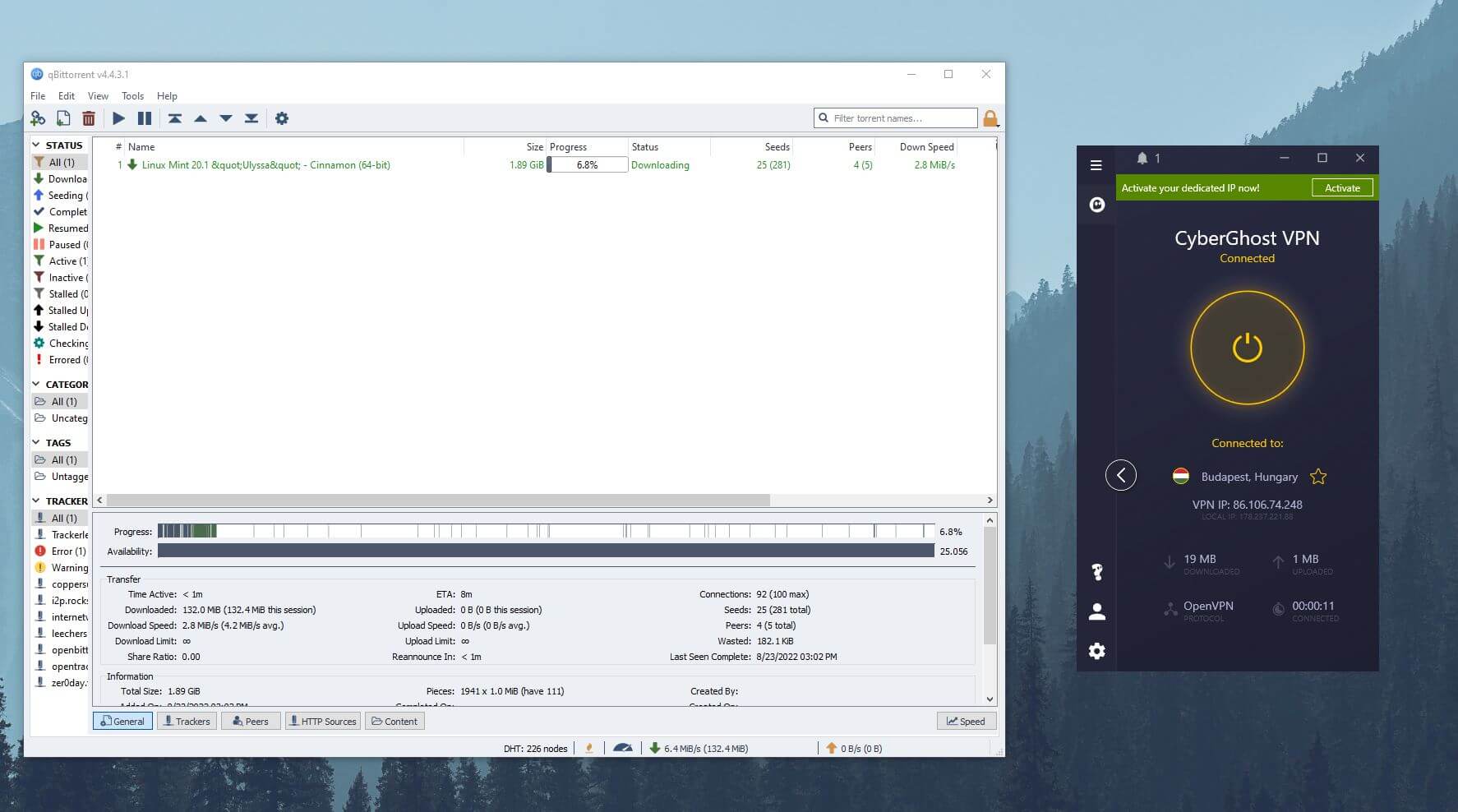
Needless to say, when I was downloading Linux (a copyright-free file) using my qBitTorrent client, I had zero issues with performance and instability. Everything was smooth and fast, making CyberGhost among the best choices for this purpose.
Who Wins?
This round of the CyberGhost vs ExpressVPN comparison is a DRAW. Both providers are capable of torrenting safely and anonymously and both offer great performance. Thus, whichever one you choose, you most likely won’t go wrong.
Are CyberGhost and ExpressVPN Working in China?
Now, let’s talk about bypassing censorship in China. Many people are interested in the best VPN for Hong Kong but it’s actually China Mainland that’s far more alarming. This country imposes censorship on every part of the internet and the Great Firewall of China now blocks nearly 10,000 sites and pages.
Unfortunately, this block includes VPN services, rendering most of them useless for people living in this country. ExpressVPN has been known to work in this country for quite some time, and in 2025, I’m happy to report that nothing has changed.
Above all, you don’t have to use special servers or protocols to make it work. It will automatically apply obfuscation, letting you slide under the radar of the Chinese government and use the VPN to unblock your favorite platforms and sites.
The only thing you need to do is connect to a server, and after that, you’re free to browse the web at your will. CyberGhost, despite offering advanced security features and all of that, lacks this obfuscation technology, which, even at this price, is a minus.
When tested in China, CyberGhost showed poor results, as it didn’t manage to bypass the Great Firewall no matter what our testers did. It simply isn’t made for this purpose and even if you ask its support team, they’ll openly tell you that the provider does not work in this country.
Sadly, due to frequent VPN bans in Turkey, CyberGhost also won’t be a reliable choice in this country, and we can say the same about Iran, which is even worse in this regard. Luckily, ExpressVPN works even in these two countries, so it’s a much better choice for bypassing censorship.
Who Wins?
It’s clear as day that ExpressVPN WINS this round of comparison by simply being more capable of bypassing censorship in China and other similar countries. CyberGhost lacks obfuscation, so it’s all but suitable for this scenario.
ExpressVPN vs CyberGhost Server Fleets: Which One Is Bigger?
One of the biggest drawbacks of the best free VPNs is their inability to maintain a big server fleet. Their finances aren’t exactly suitable for something like this because they earn no money through subscriptions. ExpressVPN and CyberGhost are well-established premium VPNs with millions of users combined.
These are very powerful providers offering access to thousands of servers in nearly 100 countries around the globe. But how big are they exactly? Let’s see…
CyberGhost (9,500+ servers in 100 countries)
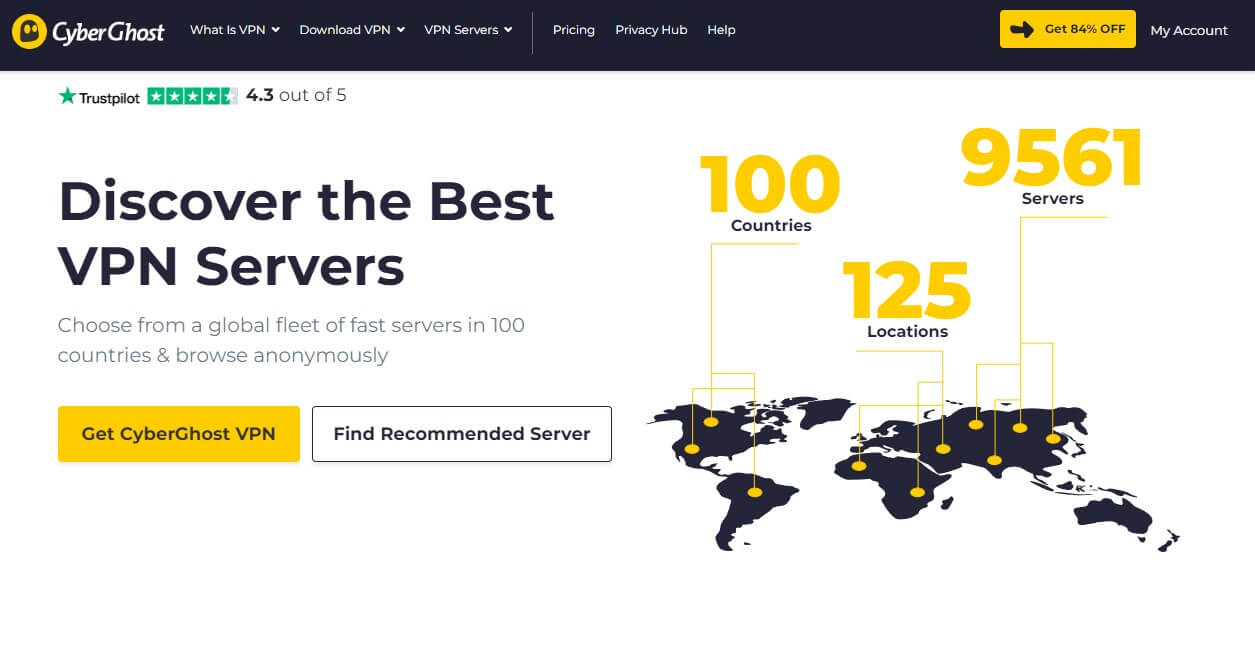
CyberGhost is, next to Private Internet Access, the largest provider on the planet. It comes with a whopping 9,500 servers in 100 countries across the planet, making it easy to find a server that isn’t overcrowded for the best performance.
We also mentioned the presence of dedicated streaming and torrenting servers, which surely adds to the variety. In addition, there are NoSpy servers for maximizing your privacy but the provider offers even Dedicated IP servers, which ExpressVPN doesn’t have.
When it comes to dedicated IP servers, you get tons of locations. They include the US, the Netherlands, the UK, Singapore, Japan, France, Germany, Australia, Switzerland, and Canada. Even better, CyberGhost has multiple locations in pretty much all of these countries.
So, aside from using a shared IP, you can get your own dedicated IP and enjoy its numerous benefits. The server distribution of CyberGhost is also something to behold. You get servers in each part of the globe, with a good combination of physical and virtual servers on offer.
The provider has servers even in Africa, in countries like the UAE, Saudi Arabia, Morocco, and many others. In the US alone, it has nearly 1,500 servers, and European users get nearly 900 servers in the UK, so we have some pretty impressive numbers.
ExpressVPN (3,000 servers in 105 countries)
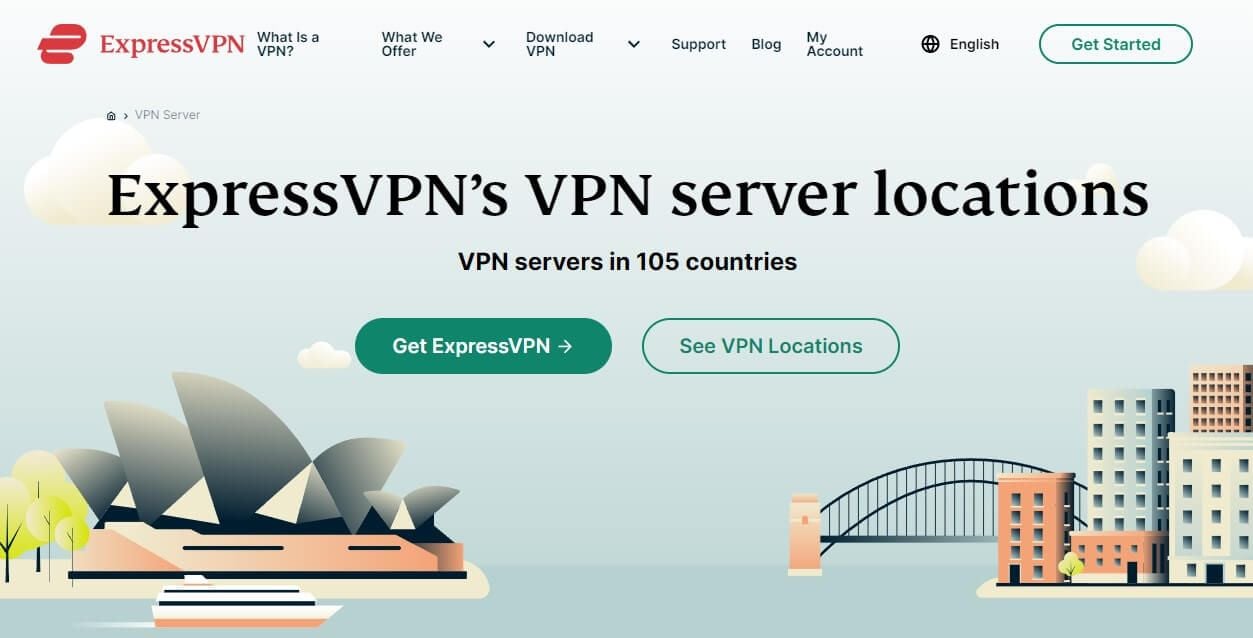
In this CyberGhost vs ExpressVPN comparison, the latter offers a significantly smaller server fleet. I mean, 3,000+ servers in 105 countries sure sound impressive but when you have a juggernaut like CyberGhost, it really pales in comparison when talking about server numbers alone.
This provider has no dedicated IP possibility so the server variety is weaker too. Albeit, we already learned that its servers are versatile and ready to tackle difficult issues with a high degree of success i.e. bypassing censorship and unblocking restricted sites.
The good thing here is the server distribution. After all, the provider has 5 countries more compared to its rival and you get 160+ worldwide locations in total. In the US, it has 20+ locations and you get tons of them in the UK, Germany, Australia, Canada, and other notable countries.
Much like CyberGhost, ExpressVPN uses some virtual servers as well since it’s impossible to have a physical infrastructure in every country. Thus, you’ll find virtual servers in India, for example. Unlike CyberGhost, this VPN doesn’t clearly state which server locations are virtual and I don’t like that.
Important to mention is that both providers use 10 Gbps servers for the best performance and since they’re based on RAM, they all provide the highest degree of privacy.
Who Wins?
In this round, CyberGhost WINS because it offers 3 times more servers than ExpressVPN plus its Dedicated IP servers that its rival doesn’t have. Its server fleet is much larger and more varied, making it a clear winner in this part of the comparison.
Customer Support: CyberGhost vs ExpressVPN
Customer support isn’t important when everything’s working fine and you’re enjoying the VPN. But as soon as things go south, you need someone to be your helping hand as soon as possible. First of all, these two providers rarely have any issues.
As said, I have used both of them for more than a decade, and so far, I think I had maybe 2 or 3 issues over ten years. These issues usually revolved around not being able to connect because a particular server was under maintenance, so it’s nothing alarming.
Still, customer support of both providers in this CyberGhost vs ExpressVPN duel was on point. They offer 24/7 support through live chat with instant responses and in the case of CyberGhost, in multiple languages (English, German, and French).
I found both support teams to be very helpful for both issues and general inquiries. Even their email support is surprisingly quick. After sending an email, I rarely had to wait for more than 20 minutes to get a response even after sending an email on Sunday at midnight.
Not to mention an in-depth help center that both VPNs have. There, you’ll find answers to all VPN-related questions, step-by-step guides, and so much more. Blog sections of both providers are active and here, you can learn a few more tidbits concerning cybersecurity.
Finally, it’s worth mentioning that both providers come with YouTube channels and they respond in the Comments section, which is yet another way of reaching customer support. Kudos to that!
Who Wins?
This part of the comparison is a clear DRAW because both providers show us exceptional support through live chat and email. Coupled with other support means like help centers, FAQs, and YouTube channels, these providers are not going to disappoint you.
Pricing Comparison: How Cheap CyberGhost and ExpressVPN Are?
As we approach the end of my ExpressVPN vs CyberGhost duel, I think it’s time to talk about how much they cost. Here, we’ll have one clear winner but let’s see which provider I’m talking about.
As always, let me start this comparison with CyberGhost.
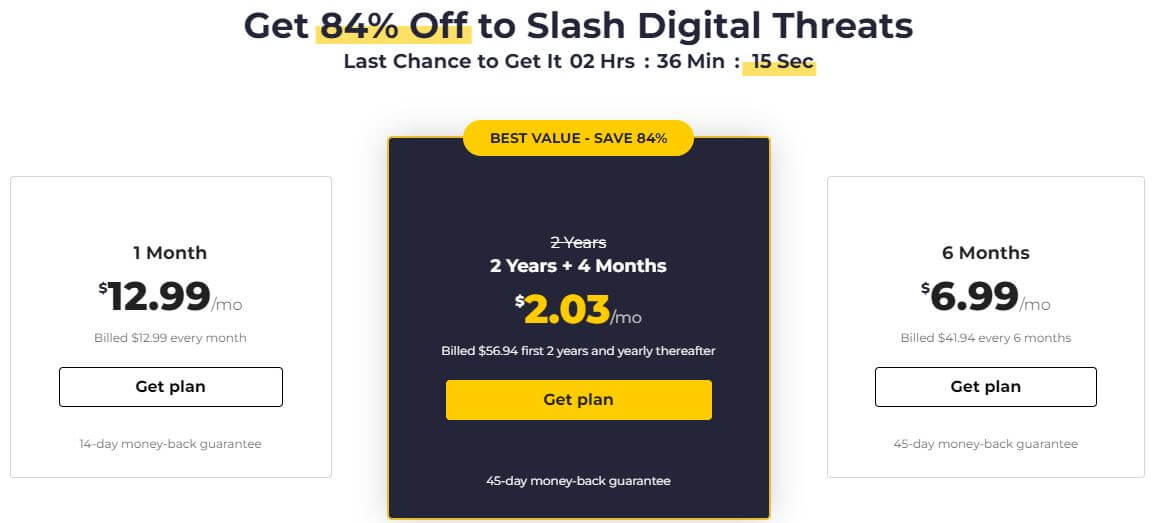
As you can see, the cheapest plan costs a bit over $2 a month, and at the time of writing this comparison, it’s a 2-year plan with 4 free months. Keep in mind that this is a current discount and the selection of plans might change, but this provider usually won’t cost you more than $3 a month.
What’s more, the provider comes with a 45-day money-back guarantee which I praised in my test and review of CyberGhost VPN. The monthly plan comes with a 14-day refund period, though, which isn’t bad and still lets you test this provider thoroughly.
Another thing that might interest you is the optional stuff. For example, you can buy the Security Suite for Windows for $1, letting you use Antivirus and Security Updater. Even if you add this feature and buy a dedicated IP, the price of this service won’t go up that much.
Either way, you get several payment methods here, which include credit/debit cards, PayPal, and Bitcoin, letting you purchase it anonymously. Do you think ExpressVPN is going to be cheaper? Well, take a look at its pricing.
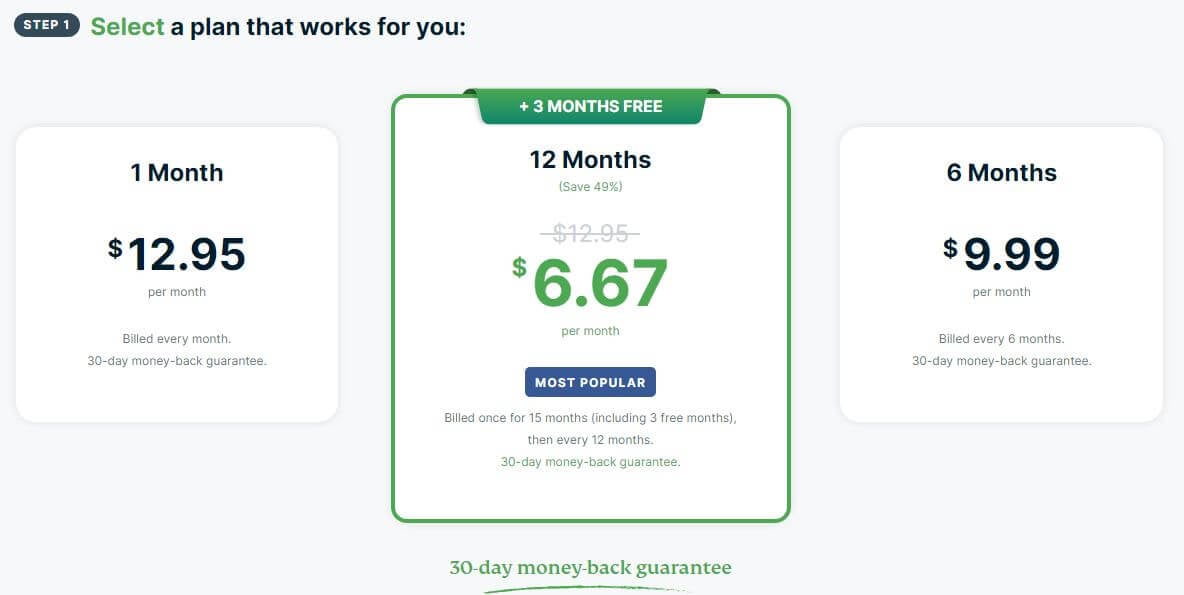
This provider’s cheapest plan is the annual one and it costs $6.67 a month with 3 free months on top of that. Here, you get a 30-day money-back guarantee for all subscription plans – even the monthly plan – which is a great choice if you want to use ExpressVPN for free for 30 days.
The payment methods include credit cards, PayPal, and Bitcoin, but also many other methods like GiroPay, Qiwi, and several more. However, it’s obvious that this is a way more expensive provider in general.
They actually offer the same plans in terms of length, aside from their cheapest plans which are different. The monthly plan from ExpressVPN is $0.04 cheaper while the 6-month plan is $3 more expensive, which is a substantial difference.
Overall, ExpressVPN isn’t cheap and that’s what bothers most people. But, as it’s almost always the case, you have to pay for the quality service. In the end, a more expensive VPN will pretty much always win, as is the case in today’s comparison.
Who Wins?
In the final round of the comparison, CyberGhost WINS again due to its significantly cheaper price and a bigger 45-day money-back guarantee. This provider is very budget-friendly when going for long-term plans, while its monthly plan is as expensive as ExpressVPN’s equivalent.
Conclusion: ExpressVPN Wins!
If we do the math, it’s 7:5 for ExpressVPN which emerges victorious over its rival CyberGhost. What can we say? The reality is that ExpressVPN is a better provider, after all, but that is completely justified because it’s more expensive.
This provider is faster, it’s better for streaming and offers the ability to bypass censorship in China. Its router compatibility is a bit better as well and it comes with simpler apps for all platforms. CyberGhost’s highlight lies in extremely affordable pricing but also capable VPN apps.
While less intuitive than its rival, this provider offers a larger server fleet, a 45-day money-back guarantee, 7 simultaneous connections, and the option to buy a dedicated IP address. Overall, though, from my experience, ExpressVPN is indeed more reliable on a grand scale.
The provider offers 8 simultaneous connections, a free password manager, and even Parental Control, which the provider from the “Yellow Team” lacks. No doubt, the “Red Team” improved significantly, even though its formula has already been nearly perfect.
However, if your budget is limited and you don’t have enough money to buy a more expensive provider, CyberGhost is perhaps THE best cheap provider. And if you don’t have constraints on your budget, I’d highly advise getting ExpressVPN instead. It will cost you more but it’ll also give you more.